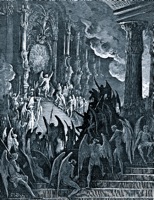Difference between revisions of "Pandemonium"
m (Text replacement - "http://" to "https://") |
|||
| Line 3: | Line 3: | ||
==Etymology== | ==Etymology== | ||
New [[Latin]], from [[Greek]] pan- + daimōn [[evil]] [[spirit]] | New [[Latin]], from [[Greek]] pan- + daimōn [[evil]] [[spirit]] | ||
| − | *Date: [ | + | *Date: [https://en.wikipedia.org/wiki/17th_Century 1667] |
==Definitions== | ==Definitions== | ||
| − | *1 : the capital of [[Hell]] in [ | + | *1 : the capital of [[Hell]] in [https://en.wikipedia.org/wiki/Milton Milton]'s [https://en.wikipedia.org/wiki/Paradise_Lost Paradise Lost] |
*2 : the infernal regions : hell | *2 : the infernal regions : hell | ||
*3 not capitalized : a wild uproar : tumult | *3 not capitalized : a wild uproar : tumult | ||
==Description== | ==Description== | ||
| − | "'''Pandæmonium'''" ([[American]] [[English]] "Pandemonium") stems from Greek "παν", [[meaning]] "all" or "every", and "δαιμόνιον", meaning "little [[spirit]]" or "little [[angel]]", or, as Christians interpreted it, "little daemon", and later, "demon" (thus roughly translated as "All Demons"); or it can be [[interpreted]] as Παν-δαιμον-ειον = "all-demon-place". It is the name invented by [ | + | "'''Pandæmonium'''" ([[American]] [[English]] "Pandemonium") stems from Greek "παν", [[meaning]] "all" or "every", and "δαιμόνιον", meaning "little [[spirit]]" or "little [[angel]]", or, as Christians interpreted it, "little daemon", and later, "demon" (thus roughly translated as "All Demons"); or it can be [[interpreted]] as Παν-δαιμον-ειον = "all-demon-place". It is the name invented by [https://en.wikipedia.org/wiki/John_Milton John Milton] for the capital of Hell, "the High Capital, of [[Satan]] and his Peers", built by the fallen [[angels]] at the suggestion of Mammon at the end of Book I, [https://en.wikipedia.org/wiki/Paradise_Lost Paradise Lost] (1667). Book II begins with the [[debate]] among the demons in the council-chamber of Pandæmonium. The demons built it in about an hour, but it far surpassed all [[human]] palaces or dwellings; it may have been small, though, since the demons are described as shrinking from their titanic size in order to fit in. |
[[Category: General Reference]] | [[Category: General Reference]] | ||
[[Category: Mythology]] | [[Category: Mythology]] | ||
Latest revision as of 01:28, 13 December 2020
Etymology
New Latin, from Greek pan- + daimōn evil spirit
- Date: 1667
Definitions
- 1 : the capital of Hell in Milton's Paradise Lost
- 2 : the infernal regions : hell
- 3 not capitalized : a wild uproar : tumult
Description
"Pandæmonium" (American English "Pandemonium") stems from Greek "παν", meaning "all" or "every", and "δαιμόνιον", meaning "little spirit" or "little angel", or, as Christians interpreted it, "little daemon", and later, "demon" (thus roughly translated as "All Demons"); or it can be interpreted as Παν-δαιμον-ειον = "all-demon-place". It is the name invented by John Milton for the capital of Hell, "the High Capital, of Satan and his Peers", built by the fallen angels at the suggestion of Mammon at the end of Book I, Paradise Lost (1667). Book II begins with the debate among the demons in the council-chamber of Pandæmonium. The demons built it in about an hour, but it far surpassed all human palaces or dwellings; it may have been small, though, since the demons are described as shrinking from their titanic size in order to fit in.
